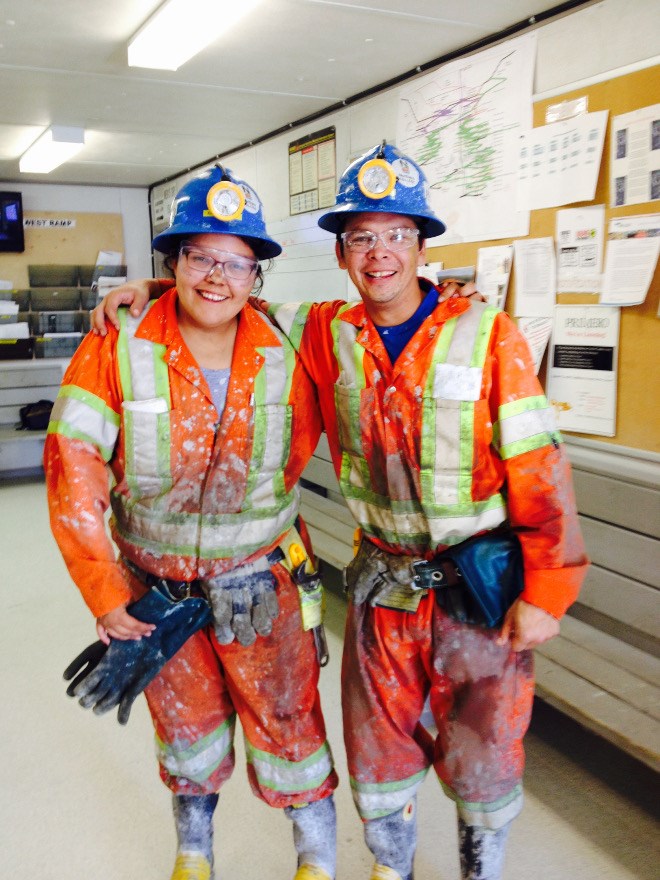A Northern College mining training program is providing a path to employment for a northeastern Ontario First Nation community.
A Feb. 24 ceremony held at the college’s Timmins campus for five Wahgoshig First Nation residents who graduated from the underground hard rock miner common core program marked the fourth and final class from a successful three-way partnership between the college, Wahgoshig, and Primero Mining Corp., operators of the Black Fox Gold Mine near Matheson.
Buoyed by funding from the province’s Aboriginal Economic Development Fund, that brings the total complement of Wahgoshig graduates to 24, with 72 per cent from that group still working in the mining industry.
The training has been a life-changing experience for many 20-somethings in the community of 170, just south of Matheson, said George Sackaney, the community’s Aboriginal liaison officer.
“We’re very happy with the success rate of the program. It gives an opportunity for our young people to get good steady employment.”
Eight years ago, the community’s unemployment rate hovered around 85 per cent. Now he places it at five per cent, with many residents working for Primero and Detour Gold in the fertile mineral belt between Timmins and Kirkland Lake.
Sackaney finds the program prepares them well to enter the workforce and meet the expectations of employers.
“I personally know eight (graduates) who are registered band members and they’re all doing great. “They were very happy with the opportunity if given the chance to better themselves, and from what I’ve seen their lives got better.”
Over eight years, Sackaney said the community and the mine have forged tight bonds and maintain a strong working relationship.
Wahgoshig has six impact benefit agreements with mining companies on their traditional land which stretches from north of Detour Lake to the Quebec border and as far south as New Liskeard, and are in the processing of negotiating a couple more training agreements, he said.
Christine Heavens, the college’s executive director of community, business development and employment services, said Primero made no guarantees that these graduates would secure work within the company, although they have hired them in the past.
“What they provide for us is that venue in a live production mine to do the training.”
But it makes sense for miners to strike training partnerships with local First Nations on whose traditional lands their operations are situated and help nurture a homegrown workforce.
Training took place at the Black Fox Mine with class time split between a trailer on surface and underground for hands-on experience.
Over 14 weeks, the classes of six to seven students learn staging, rock bolting, scaling, lock and tagging, blasting, mucking, drilling and other essential skills.
While the Primero-Wahgoshig training partnership has run its course, the hard rock miner program – which boasts a 96 per cent employability rate – continues on with other mining companies and communities.
At Glencore’s Kidd Mine operations in Timmins, the college regularly runs an intake of new students every seven weeks.
The training centre is situated underground at the mine’s 2400 level with instruction provided by a company trainer seconded by the college.
“They know their mining policies and procedures best and they can embed that within the culture of the training environment,” said Heavens.
By the sixth week of instruction, students are blended into the regular workforce involved in live production.
While the production life of one of Timmins’ cornerstone mines runs out in 2022, Heavens said graduates continue to land employment with contractors and other mining companies who are expanding or investing in new developments.
“Although every mine has its life, we’ve come to realize in the northeast that the mines just continue to pop up,” she said. “The employment possibilities within that sector are endless.”
To the west, Richmont Mines, operators of the Island Gold Mine near Dubreuilville, is in hiring mode as the company seeks to develop a high-grade gold extension at the site.
The college is teaming up with the Michipicoten and Missanabie Cree First Nations to launch the hard rock common core program in Wawa in March.
With 28 potential enrollees attending a recent information session, Heavens said “it shows how much interest there is. The region is pretty excited about the possibility of employment with the mine.”
Heavens said the program basics essentially remain the same with some location and instructional tweaks depending on the industry partner.
“We have to customize according to the mine’s individual policies and procedures. Our students have to live by those procedures, same as any employee does at that mine site.”
The college frequently reaches out to industry to solicit feedback on what skills they prefer in new hires and ask human resource companies to mentor students and conduct mock job interviews.
“We’re always talking about what their needs are and that’s why we’ve also embedded some employability skills and certifications,” including surface miner and health and safety modules to give students that extra job-hunting advantage.
Heavens said the common core program, funded through Aboriginal Economic Development Fund, definitely sees new opportunities for 2017 as a new round of proposal applications opens in April.
“We’re eager to work with any of the First Nation communities to be able to submit for training opportunities that will enhance economic development within their area.”




